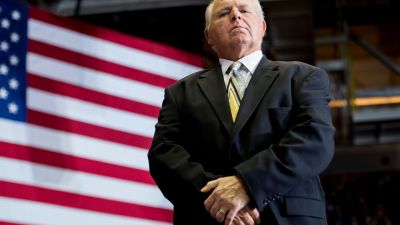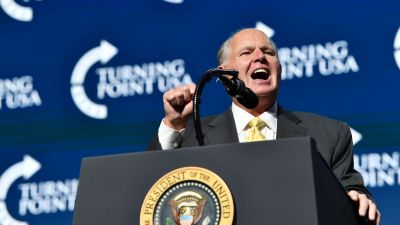
The New York Times. (Photo by sam chills/ flickr CC 2.0)
You have to have a pretty long memory to recall Roman Hruska, a beefy, bespectacled, old-school conservative Republican senator from Nebraska who served from 1954 to 1976 and looked right out of central casting for a Midwestern Rotarian.
Hruska was not given to soaring oratory or intellectual derring-do, but he did make one lasting contribution to our political dialogue. It was during the Senate debate in 1970 over Nixon’s Supreme Court nominee G. Harrold Carswell. Carswell had been labeled a racist and a mediocrity when Hruska boldly came to his defense. “Even if he were mediocre,” Hruska declared, “there are a lot of mediocre judges and people and lawyers. They are entitled to a little representation, aren’t they, and a little chance? We can’t have all Brandeises, Frankfurters and Cardozos.”
So you wouldn’t exactly call Hruska a liberal exemplar, but I thought of him this week when The New York Times, in a Hruska-type move, announced it was adding Bret Stephens to its roster of op-ed page columnists. To hear The Times tell it, Stephens is no mediocrity. (As you’ll see, there is some doubt about that.) Though I never read him regularly at The Wall Street Journal, where he won a Pulitzer Prize for commentary, The Times has portrayed him as fitting into the sensible, intellectual, head-over-heart, ideology-over-empathy, markets-over-mankind wing of conservatism, and he won points on the left for his vehement opposition to Donald Trump — which is something when so many Never Trumpists on the right seem to have taken that declaration the way Trump took his marriage vows. But whether Stephens is a journalistic Carswell or not, what struck me wasn’t mediocrity. Rather, what struck me is what the Times’ hiring of Stephens says about the media in this perilous moment for democracy, for decency and for common sense.
What I think it says is that the media, at least the mainstream, slightly left-of-center media like The Times, seem eager to make common cause with the less vituperative elements of the right, almost as a way of making amends. In the process, they may be normalizing the very things that made Trump possible.
You might ask, amends for what? You would be right to think, I believe, that the press should be making amends for the way they tilted the election to Donald Trump. But the amends I am talking about are to white, non-liberal America, whom the mainstream media apparently feel they neglected or offended and who then took their revenge by electing an authoritarian crackpot.
A lot of the fallout on the left for Trump’s election has centered on this mea culpa idea. Liberals were smug, complacent, arrogant, even imperial. They demeaned white working-class America. They called them bigots while ignoring the disruptions that cultural liberalization and globalization had visited upon them. No one seemed to be listening to them except Trump, who not only listened but also spoke their language. In the end, then, this was as much an election about disrespect — elites for working-class whites — as about economics or social cleavages. As both a form of penance (those amends) and of self-protection, liberals and liberal media need to reach out and demonstrate some respect. Or at least that is one way of thinking.
But whether you believe in this self-flagellation or not, do we really need to give conservatives another platform, and in the most influential paper, no less? Must it always be one conservative for one liberal? The Times apparently thinks so.
I suppose the Gray Lady believes hiring conservatives is the mature, centrist thing to do — the rational, grown-up approach to America’s cultural and political civil war. It demonstrates that Times writers and editors aren’t all passionistas, that they don’t take anyone for granted, and that while they may choose sides, they aren’t going to be too vehement about it.
Indeed, this is largely how the paper’s op-ed editor James Bennet has described the Stephens hire. He was quoted in The Huffington Post saying that if The Times were “serious about not cocooning ourselves, and our readers are, then we have to hear points of view that sometimes make us uncomfortable.”
There is nothing necessarily wrong with this, even though it isn’t as if liberals don’t hear things that make them uncomfortable all the time. Still, a pluralistic society like ours needs pluralistic viewpoints. But here’s the rub. The Times, like all mainstream media, isn’t a giant chat room where everyone gets to have his or her say. It is a gatekeeper that only allows certain people through, and when it does, it is giving them both its megaphone and blessing.
So Bennet is being a bit disingenuous when he says, pace Hruska, that he is simply providing different viewpoints. He is providing highly selected different viewpoints — those that pass muster at The Times, which makes the amends less than full-throated. If you really wanted a spectrum of opinion, why not give space to the extremists of the “alt-right,” or even conspiracy whacko Alex Jones? And if you really want to understand the reactionary populist movement that gave us Donald Trump, why not come down from the Burkean Mt. Olympus where all conservative intellectuals seem to dwell and give us an honest-to-God reactionary populist? I hear Steve Bannon might be available soon.
This is the Times’ dilemma, which is what comes from hoping to pacify conservatives. The paper is trying to calibrate a position of “high” conservatism that distances itself from the populist twaddle of Trump while also trying to plug into the “other side.” The dilemma is that for all their supposed high-mindedness, there is really very little distance between those double-dome conservatives and the Trumpistas. Take free trade off the table, and those supposedly sensible conservatives like Stephens believe many of the same things as the insensible ones. Basically, it is a matter of manners. Trump acts like a boor, and they don’t.
As the estimable political historian Rick Perlstein wrote in The New York Times Magazine, a lot of folks were surprised by the Trump phenomenon because they failed to see how much Trump was actually a creature of conservatism itself, with its long tradition of nuttiness, and not a departure from it. That means that promoting conservatism, however much those intellectual conservatives may howl in protest to say so, is a way of promoting Trumpism.
And therein lies another rub. Bret Stephens, that Burkean avatar, isn’t all that sensible. For one thing, he happens to be a climate change denier. Well, not exactly a denier. Bennet calls him an “agnostic.” Stephens says that because the scientific certainties of one era become the errors of another, one can never be sure that climate change is a manmade phenomenon. Of course, by that standard, you might as well throw everything out the window since you never know what tomorrow might bring.
He is also apparently given to exaggeration, like comparing climate change believers to “closet Stalinists,” and Obama’s nuclear deal with Iran to Neville Chamberlain’s appeasement of Hitler at Munich, only worse. According to the website ThinkProgress, he also seems to doubt campus rape statistics, hunger in America, and institutionalized racism. He calls them “imaginary enemies.”
This is the spectrum of opinion that is now receiving the Times’ imprimatur. You might call it intellectual mediocrity.
You can tie yourself into all sorts of knots when you treat modern conservatism as totally disconnected from Trumpism, and as a serious approach to problems rather than as a way to justify the prevailing social order. That isn’t to say that one shouldn’t treat individuals, even those with whom we have deep disagreements, with respect. It is to say that we don’t necessarily have to respect their opinions, and it certainly doesn’t mean that any media organization is required to give them a soapbox.
So The Times can magnanimously give space to a climate change denier (excuse me, “agnostic”) in the interests of giving the right yet another forum and showing how civil The Times is. By letting the right have a voice, it can try to exorcise its guilt over its neglect of the white working class and its shortsightedness in missing the Trump phenomenon, even if that voice is hysterical. This is the Roman Hruska way. Everyone gets a chance. Even people who are wrong, even people who are basically bankrupt of new ideas, even people who keep shilling the same old anti-liberal shibboleths, deserve a place in the public discourse and in the nation’s leading newspaper.
Or do they?




